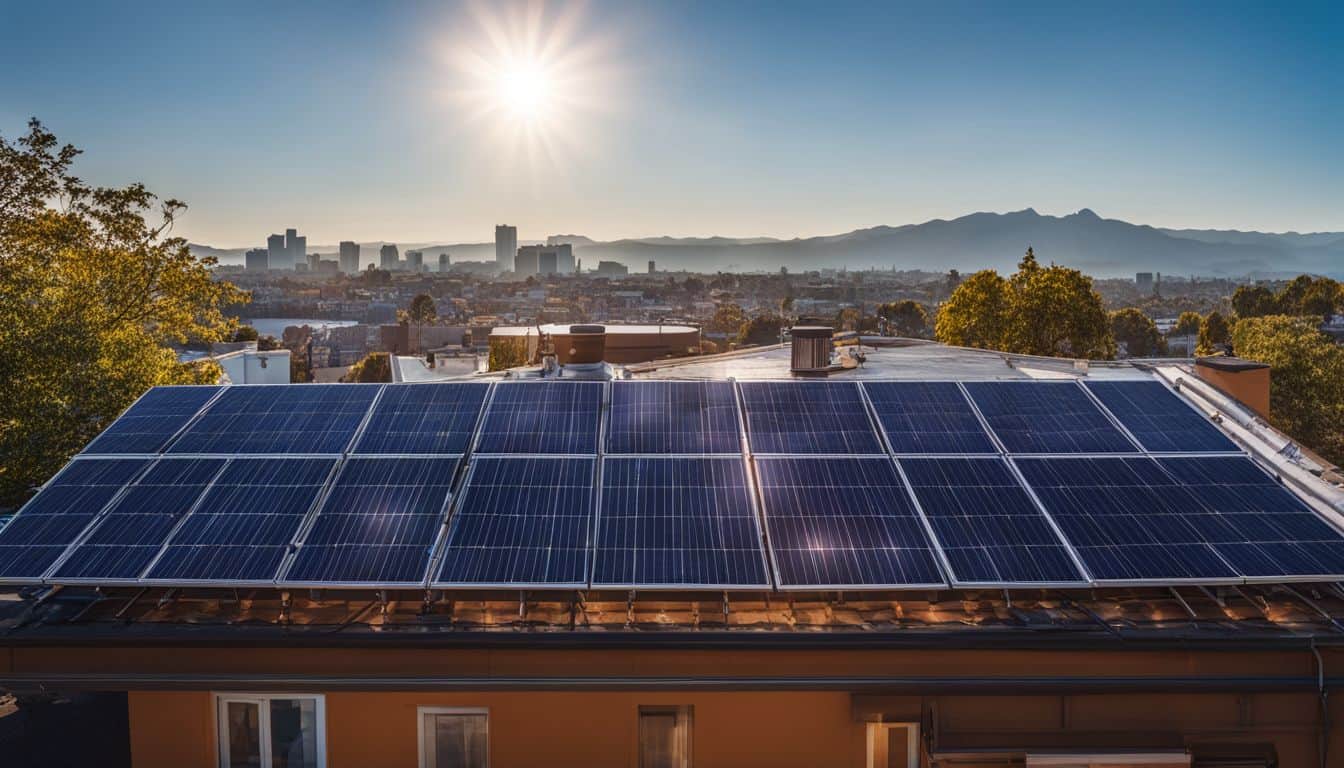In an era where environmental consciousness is paramount, solar heating panels have emerged as a powerful tool for homeowners looking to reduce their carbon footprint. This comprehensive guide explores how these innovative systems can significantly lower your environmental impact while providing efficient heating solutions for your home.
Understanding Carbon Footprint
Before getting into the benefits of solar heating panels, it’s crucial to understand what a carbon footprint is. Your carbon footprint represents the total amount of greenhouse gases, primarily carbon dioxide, that your activities produce. For households, major contributors include energy consumption for heating, cooling, electricity, transportation, and waste production.
How Solar Heating Panels Work
Solar heating panels, also known as solar thermal collectors, harness the sun’s energy to heat water or air for domestic use. These systems typically consist of solar collectors, a storage tank, and a heat transfer system. There are two main types of solar heating systems:
- Solar water heating systems: These heat water for domestic use, reducing reliance on traditional water heaters.
- Solar space heating systems: These provide warmth for your home, either through radiant floor heating or by heating air that is then circulated.
For a detailed explanation of the installation process, check out our step-by-step guide to solar heating panel installation.
Carbon Footprint Reduction Mechanisms
Direct Emission Reduction
Solar heating panels significantly reduce carbon emissions by replacing or supplementing fossil fuel-based heating systems. By harnessing the sun’s energy, these panels lower your reliance on natural gas, oil, or electricity derived from non-renewable sources. This direct reduction in fossil fuel consumption translates to a substantial decrease in your household’s carbon emissions.
Lifecycle Emissions Comparison
When considering the environmental impact of solar heating panels, it’s important to look at their entire lifecycle. While the production of solar panels does have a carbon footprint, studies show that this is offset within 1-4 years of operation, depending on the system and location. Solar heating panels produce significantly fewer emissions over their 25-30 year lifespan than traditional heating methods.
Quantifying Carbon Footprint Reduction
The exact reduction in carbon footprint from solar heating panels varies based on factors such as system size, local climate, and the energy sources being replaced. However, on average, a solar water heating system can reduce a household’s carbon footprint by 1-2 tons of CO2 per year. This is equivalent to the carbon sequestered by 1.5-3 acres of U.S. forests annually.
Additional Environmental Benefits
Beyond reducing carbon emissions, solar heating panels offer several other environmental benefits:
- Reduced air pollution: Solar heating systems help improve local air quality by decreasing reliance on fossil fuels.
- Conservation of non-renewable resources: Solar energy is abundant and renewable, helping preserve finite fossil fuel resources.
- Water conservation: Some solar heating systems, particularly those used for space heating, can reduce water consumption compared to traditional heating methods.
Economic Incentives for Adoption
While the environmental benefits are compelling, the economic advantages of solar heating panels make them even more attractive. Many governments offer rebates and tax incentives for installing solar heating systems. Additionally, these systems can lead to significant long-term savings on energy bills, often paying for themselves within 5-10 years.
For more information on how solar heating panels contribute to sustainable living, including their economic benefits, visit our guide on achieving sustainable living with solar heating panels.
Challenges and Considerations
While solar heating panels offer numerous benefits, there are some challenges to consider:
- Initial installation costs can be high, although they are often offset by long-term savings and incentives.
- Geographic and climate limitations may affect efficiency in some regions.
- Regular maintenance is required to ensure optimal performance, although this is typically minimal.

Future Outlook
The future of solar heating technology looks promising. Ongoing advancements are improving efficiency and reducing costs. Integration with smart home systems is making these panels more user-friendly and efficient. As technology progresses, we can expect even greater reductions in carbon footprint from solar heating systems.
Conclusion
Solar heating panels offer a powerful way to reduce your carbon footprint while providing efficient heating solutions for your home. By harnessing the sun’s energy, these systems significantly lower reliance on fossil fuels, leading to substantial reductions in carbon emissions. With additional environmental benefits, economic incentives, and ongoing technological advancements, solar heating panels represent a smart choice for environmentally conscious homeowners.
For those looking to take the next step, our guide on mastering solar heating panels for homeowners provides valuable insights into maximizing the benefits of these systems.
FAQS
How do solar heating panels help reduce greenhouse gas emissions?
Solar heating panels significantly cut greenhouse gas emissions by providing clean energy from the sun:
- They generate electricity without burning fossil fuels like coal or natural gas
- Every kilowatt-hour of solar power used avoids the CO2 emissions that would come from conventional energy sources
- By 2025, solar power could offset 119 million metric tons of carbon dioxide annually, equal to taking 129 million cars off the road
- Choosing solar helps slow climate change by reducing the greenhouse gases that trap heat in our atmosphere
What financial benefits do solar heating panels offer homeowners?
Installing solar heating panels can lead to substantial savings on energy bills:
- Homes with solar can significantly reduce or even eliminate their electricity expenses
- Excess solar power generated can be sold back to the grid, earning homeowners credits on their utility bills
- Many areas offer tax incentives and rebates for installing solar, helping offset the upfront costs
- Solar panels can increase a home’s resale value, providing a strong return on investment
How does the growth of solar power contribute to the economy?
The expanding solar industry drives economic growth and creates jobs in many sectors:
- In 2020, the solar industry employed over 230,000 people in the United States across manufacturing, installation, and maintenance
- Solar installations surged to over 76 gigawatts in the U.S. by 2020, demonstrating the industry’s rapid growth
- Increased demand for solar panels supports businesses and spurs innovation in renewable energy technology
- As more homes and businesses adopt solar, the economy benefits from reduced energy costs and increased energy independence
Do solar panels have their own carbon footprint?
While solar panels are a clean energy source, it’s important to consider their lifecycle carbon footprint:
- Manufacturing solar panels does require energy, often from fossil fuels, which generates some greenhouse gas emissions
- However, the emissions associated with solar panel production are far lower than the emissions they prevent over their lifetime
- Most solar panels recoup their carbon footprint within a few years and provide decades of clean energy
- Proper recycling of solar panels at the end of their life helps minimize their environmental impact
What role do solar heating panels play in the transition to renewable energy?
Solar heating panels are a key component of the shift away from fossil fuels and towards clean, renewable energy sources:
- They offer a scalable and increasingly affordable way to generate electricity without greenhouse gas emissions
- Solar power can be harnessed at both the residential and utility scale, providing a flexible energy solution
- As solar technology continues to improve and costs decline, it becomes an increasingly viable alternative to traditional energy sources
- Widespread adoption of solar heating panels, along with other renewables like wind power, is crucial for mitigating climate change

Leave a Reply